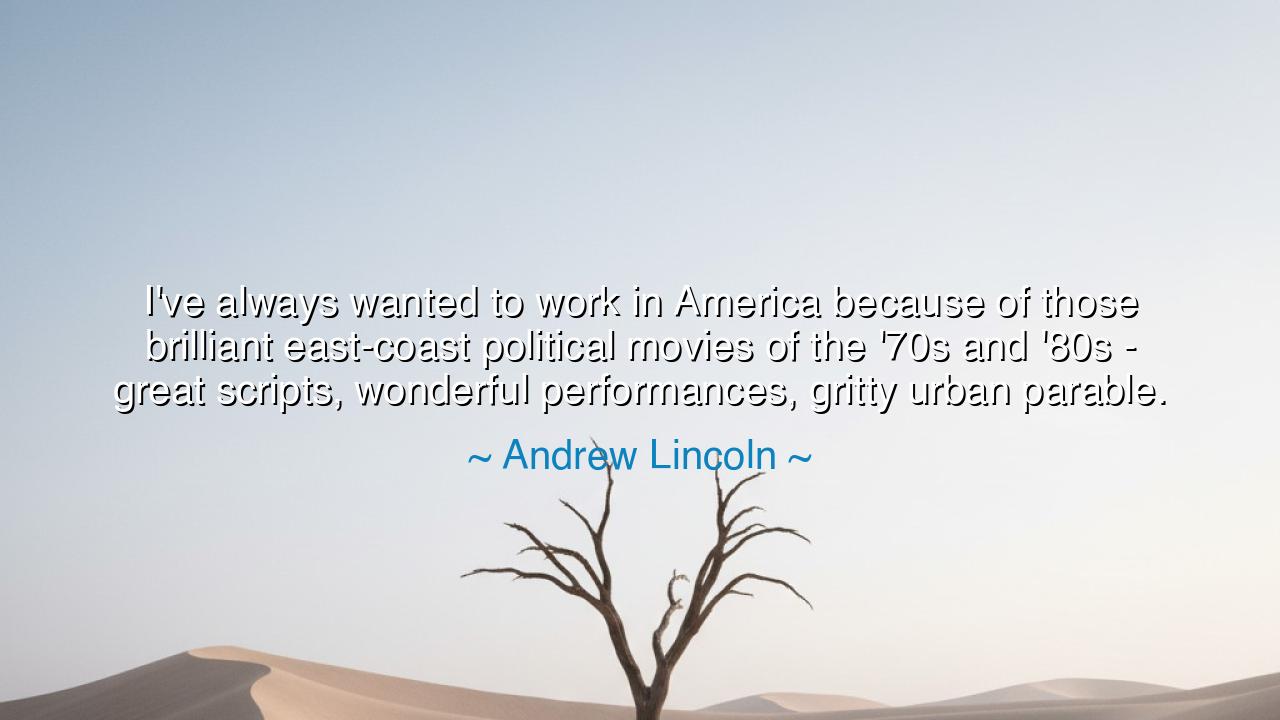
I've always wanted to work in America because of those brilliant
I've always wanted to work in America because of those brilliant east-coast political movies of the '70s and '80s - great scripts, wonderful performances, gritty urban parable.






In the vast theater of life, where our ambitions often stretch beyond the horizons of our humble beginnings, there exists a yearning within the hearts of many to be a part of something greater. And thus, the words of Andrew Lincoln echo across time: “I’ve always wanted to work in America because of those brilliant east-coast political movies of the ‘70s and ‘80s – great scripts, wonderful performances, gritty urban parable.” This simple reflection speaks to the human desire to be drawn toward greatness, to seek out places and moments where stories are told with a raw, unflinching truth. It speaks to the enduring power of storytelling, where a narrative becomes a mirror of our deepest struggles, our highest ideals, and the relentless pursuit of justice.
America, in those glorious decades, was a crucible of change, a land where the tumultuous tides of history clashed with the voices of artists, visionaries, and dreamers. The 1970s and 1980s were times of great upheaval, yet also of great artistic triumph. The urban landscape of the East Coast, from the streets of New York to the alleys of Philadelphia, became the stage upon which some of the most potent dramas of the modern era were enacted. Lincoln speaks of a desire to immerse himself in this world, where great scripts and wonderful performances painted the lives of ordinary men and women in stark shades of light and dark. It was a time when art had the power to change minds and shift hearts, a time when every frame, every word spoken on screen, resonated with truth.
To understand this yearning, we must first understand the power of art in shaping our perception of the world. In the wake of the civil rights movement, the Vietnam War, and the relentless march of modernity, political movies emerged as a means of reflecting society’s pain and promise. Movies like All the President’s Men, The Godfather, and Dog Day Afternoon captured the grittiness of the urban landscape, the struggles of everyday people against the weight of institutions, and the tension between power and the powerless. These films were not merely entertainment; they were parables, stories with deep moral lessons that would transcend the era in which they were born.
The East Coast, with its bustling cities and its historical weight, became the perfect backdrop for these narratives. It was a land where the spirit of individualism clashed against the machine of government, where every person, regardless of their station, sought to make sense of a world that seemed to be unraveling. And so, Lincoln, in his admiration of this era, reflects a timeless truth—that we are all drawn to those places where the human experience is laid bare, where every word and action speaks to a greater struggle for meaning, for justice, and for understanding. It is here that the soul of the artist finds its truest expression.
Consider the journey of another, the great Orson Welles, whose film Citizen Kane is hailed as one of the finest examples of the power of storytelling. Welles, much like Lincoln, was drawn to America’s promise of artistic freedom, where he could create something that would resonate for generations. The narrative of Citizen Kane, with its exploration of power, loneliness, and the search for meaning, is not unlike the gritty urban parables Lincoln yearned to be a part of. These were stories that asked not only questions of society but also questions of the soul itself—what does it mean to live a life of purpose? How does the individual stand against the forces that seek to shape them?
From this, we must draw the lesson that art—whether in the form of film, literature, or music—has the unique power to guide us through the storms of life, to provide both a mirror and a map. It offers us the chance to see ourselves as we truly are, unadorned and stripped of pretense, and challenges us to rise above the chaos of the world. Andrew Lincoln’s words remind us that we, too, should seek out those places of power and creativity, where the struggle for truth and justice is laid bare. Whether through our work, our passion, or our actions, we must strive to make a difference—just as those films of the ‘70s and ‘80s did.
Action, then, is the essence of this lesson. Seek out those stories that speak to your soul, that stir the embers of your spirit. Find the places in your life where you can make a difference, where you can engage with the struggles of the world, whether through art, through activism, or through simple acts of kindness. And let these struggles be your parables, your teachings, just as the gritty films of the past spoke to the people of their time. Like Lincoln, let us seek to be part of something greater than ourselves, to add our voices to the narrative that speaks of truth, of struggle, and of justice. For in the end, it is these stories—these parables—that will endure, long after the passing of the moment.






AAdministratorAdministrator
Welcome, honored guests. Please leave a comment, we will respond soon